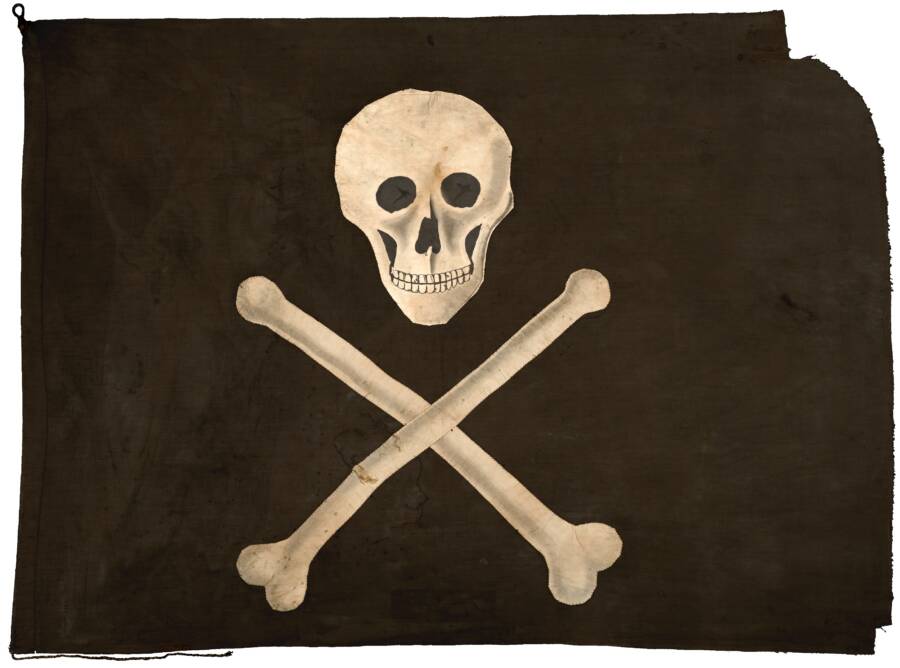
ALLTHATSINTERESTING.COM
From Blackbeard To Anne Bonny, Go Inside The Stories Of 27 Famous Pirates From History
Wikimedia CommonsThe Jolly Roger, a common flag flown by some famous pirates.From roughly the 1650s to the 1730s, the world was in the throes of the Golden Age of Piracy. Although its often romanticized in recent years, it was a brutal and tumultuous time period, with thousands of pirates terrorizing the worlds oceans, disrupting global trade routes, and challenging the naval supremacy of Europes greatest empires.While popular culture has sometimes portrayed pirates as swashbuckling adventurers who were simply seeking treasure and freedom, the reality was often a far more complex story of desperation, violence, and rebellion against the rigid social hierarchies of the early modern world.Learn about some of historys most famous pirates below.Click here to view slideshowThe Rise Of Famous Pirates During The Golden Age Of PiracyThe Golden Age of Piracy emerged from a perfect storm of historical circumstances. The expansion of European colonialism had created lucrative trade networks across the Atlantic, with ships laden with sugar, tobacco, silver, and enslaved people crossing between the Old World and the New World. Simultaneously, various European wars including the War of Spanish Succession had produced countless experienced sailors who suddenly found themselves unemployed when peace treaties were signed.These men (and sometimes women), skilled in naval warfare but often facing poverty and harsh conditions in legitimate maritime employment, turned to piracy as a more profitable and, paradoxically, more egalitarian alternative.As historian Mark Cartwright explains in the World History Encyclopedia, the Caribbean was one of the biggest centers of pirate activity, with Nassau in the Bahamas known at the time as New Providence Harbour serving as an unofficial pirate haven around 1700. Here, pirates created their own societies, governed by codes that were surprisingly democratic for their time. Wikimedia CommonsCapture of the Pirate, Blackbeard, 1718 by Jean Leon Gerome Ferris.Unlike the stricter hierarchies aboard naval and merchant vessels, pirate crews often voted for their captains and quartermasters, and they distributed plunder according to agreed-upon shares. Every crew member had a vote in major decisions, and many pirate codes included provisions for compensation if sailors were injured in battle an early form of workers' compensation that often didn't exist in legitimate maritime employment.Of course, many tales about famous pirates were heavily exaggerated. "Pirate adventures and courtroom trials made good press stories," writes Dr. Robert Blyth, the author of Buried Treasure: A Pirate Miscellany. Blyth adds: "They featured regularly in early eighteenth-century newspapers and helped shift copies to a public keen to learn the grisly details of the latest pirate heist or the most recent death sentences. But journalists and editors also exaggerated their stories to make pirates appear even more violent and destructive. The 'golden age of piracy' was no stranger to fake news!"The Golden Age of Piracy had to come to an end eventually, though. At the end of the day, pirates were still thieves (and often killers), and their widespread presence was a constant threat to the European empires, which relied on naval transport and shipping to supply their colonies. The Decline And Lasting Legacy Of PiracyThe Golden Age of Piracy began to wane around the 1720s, as European powers finally coordinated effective responses to the pirate threat. Ultimately, the appointment of former privateer Woodes Rogers as governor of the Bahamas in 1717 marked a major turning point. Rogers offered pirates the King's Pardon amnesty in exchange for abandoning piracy. Meanwhile, authorities simultaneously brought military forces to fight against those who refused pardons. Many pirates accepted pardons, while others were hunted down by aggressive naval patrols.Some famous pirates were executed in a brutal and public fashion. Their deaths became spectacles designed to deter other would-be pirates."Hanging was a grisly affair during the 'golden age' of piracy," Blyth writes. "Unlike in the nineteenth century when the 'drop' was calculated to break the neck, leading to near-instant death a short rope was used, which left the condemned to strangle slowly to death, which could take up to 45 minutes."Wikimedia CommonsCaptain William Kidd, publicly gibbeted after his hanging in 1701.Improved naval coordination between European powers, increased patrolling of the world's oceans, and the gradual establishment of more robust colonial governance made piracy increasingly unsustainable. By the early 1730s, the Golden Age of Piracy had effectively ended, even though piracy itself would never completely disappear from the world's seas.The legacy of the Golden Age of Piracy extends far beyond its historical moment, though. Pirates sometimes represented a form of proto-democratic rebellion against imperial authority and maritime exploitation, creating surprisingly egalitarian communities during a deeply hierarchical age. Their codes, their elections, and their systems of sharing wealth offered an alternative model of social organization that would later be studied by historians for insights into other class struggles and resistance movements.Even today, there is a certain appeal to the idea of old-fashioned piracy. Despite the many negatives associated with it, the life of a pirate was also a life that offered a sense of freedom, independence, and self-sufficiency ideals that many people today may feel they are lacking. It's not difficult to see why popular culture has been so captivated by the legendary tales of swashbuckling and seafaring adventures. After reading about these famous pirates, go inside the history of the iconic pirate phrase "shiver me timbers." Then, learn about Port Royal, the pirate haven that was once known as "the wickedest city on Earth."The post From Blackbeard To Anne Bonny, Go Inside The Stories Of 27 Famous Pirates From History appeared first on All That's Interesting.
0 Reacties
0 aandelen
27 Views


